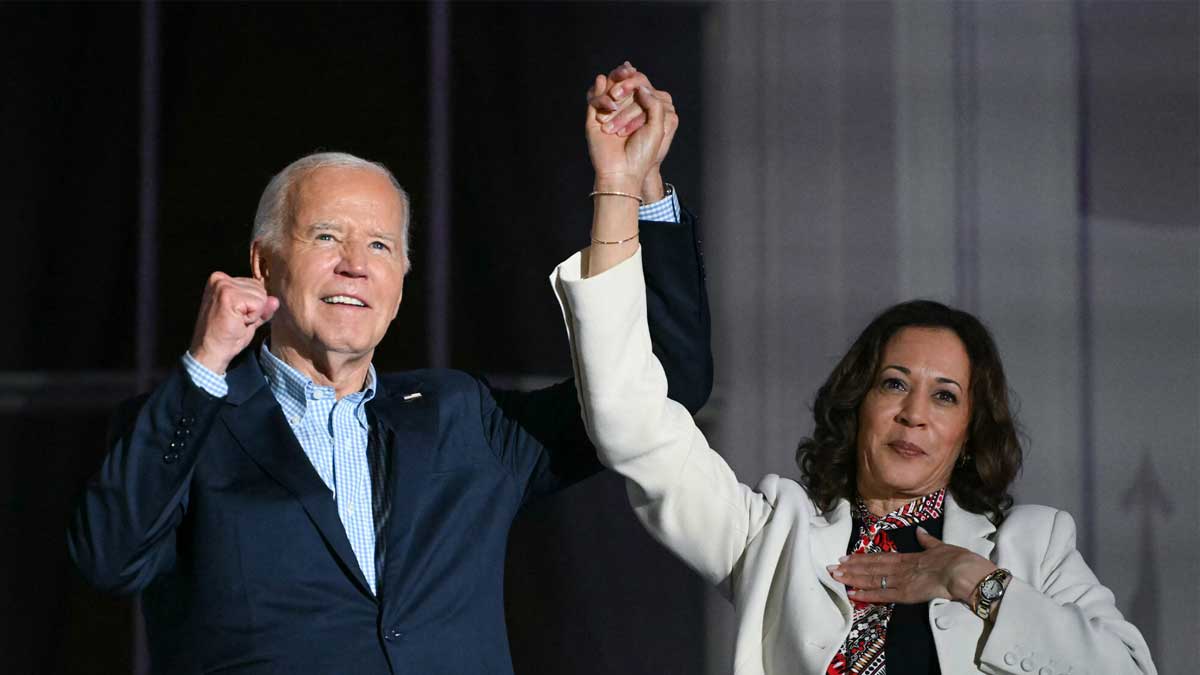- Home
- Billionaires
- Investing Newsletters
- 193CC 1000
- Article Layout 2
- Article Layout 3
- Article Layout 4
- Article Layout 5
- Article Layout 6
- Article Layout 7
- Article Layout 8
- Article Layout 9
- Article Layout 10
- Article Layout 11
- Article Layout 12
- Article Layout 13
- Article Layout 14
- Article Sidebar
- Post Format
- pages
- Archive Layouts
- Post Gallery
- Post Video Background
- Post Review
- Sponsored Post
- Leadership
- Business
- Money
- Small Business
- Innovation
- Shop
Recent Posts
Kamala Harris: Potential Biden Replacement and Her Record

The potential for Vice President Kamala Harris to replace President Joe Biden as the Democratic nominee has become increasingly plausible over the past two days. Reports suggest that Biden is contemplating stepping down, making Harris a leading candidate to take his place. Despite her seamless fit into the role given her current position, Harris faces challenges due to her mixed political record and relatively low approval ratings, which could hinder her chances in a general election against former President Donald Trump.
Prominent Democrats are increasingly advocating for Harris as the most viable alternative should Biden withdraw. Recent reports indicate that Biden is now considering this possibility more seriously, influenced by private shifts in support from key party leaders. Polling data indicates that Harris could potentially perform better than Biden in a matchup against Trump. Harris’s approval ratings among Black and Hispanic voters, two crucial demographics where Biden has lost support since his 2020 campaign, are notably higher than Biden’s. This could give Harris an edge in regaining lost ground among these voter groups.
Moreover, Harris’s existing presence on the ticket would facilitate a smoother transition of campaign funds from Biden to her, avoiding the complexities of transferring resources to a new candidate. However, her current approval rating stands at 37%, according to FiveThirtyEight’s latest average, reflecting concerns within the Democratic Party. This figure, while a concern, is consistent with Biden’s own approval numbers, which may suggest that dissatisfaction is a broader issue affecting the entire administration rather than Harris alone.
Harris has faced significant scrutiny regarding her public performance and political presence. Critics have highlighted a perceived lack of visibility and effectiveness. A critical profile in the New York Times suggested that Harris has struggled to assert herself and make a strong case for her leadership. Tensions between the White House and Harris’s office, as reported by CNN, have further complicated her public image. For instance, her remarks during a 2021 trip to Guatemala—where she advised Guatemalans against coming to the U.S. and failed to provide a satisfactory explanation for not visiting the U.S. border—provoked backlash. The disorganization surrounding her first visit to the border, which reportedly caught her staff off guard, was seen as indicative of broader management issues within her team.
Harris’s bid for the presidency in 2020, during her tenure as a California senator, did not meet expectations. Her campaign faltered before the primaries began, plagued by poor polling and insufficient financial backing. A 2019 Times article noted several strategic errors and staffing challenges that contributed to her early withdrawal from the race. Additionally, Harris’s tenure as a prosecutor has been criticized, especially regarding her handling of police misconduct cases and marijuana-related offenses. Critics argue that she did not sufficiently address police wrongdoing and oversaw a significant number of marijuana convictions during her time as California Attorney General.
Despite these criticisms, Harris’s positions on criminal justice have evolved. As a senator, she supported drug decriminalization and later backed Biden’s 2022 decision to pardon individuals convicted of federal marijuana possession. This shift suggests a move away from her earlier stances. In the wake of George Floyd’s death, Harris challenged the idea that increasing police presence improves safety, reflecting a broader reassessment of her views on law enforcement.
In a recent CNN/SSRS survey, Harris performed better against Trump compared to six other potential Biden replacements, trailing by just two points, whereas Biden trailed by six points. Trump led Harris and other potential candidates, including Michigan Governor Gretchen Whitmer and California Governor Gavin Newsom, by five points. Harris, with her mixed heritage of Indian-American and Jamaican-American descent, might help the Democratic Party reconnect with Black and Hispanic voters. According to a June Politico/Morning Consult poll, Harris enjoys slightly better favorability among Black voters (67%) compared to Biden (63%), and she also has a marginally higher approval rating among Hispanic voters.
The Democratic Party lacks a clear consensus on a replacement for Biden, but Harris is increasingly seen as a strong contender. Former Representative Tim Ryan and House Minority Leader Hakeem Jeffries have both endorsed Harris as a suitable successor. Representative James Clyburn has publicly supported Harris as the potential nominee if the party chooses her. Given the political dynamics, Biden would likely have little choice but to endorse Harris if he decides to step down, as obstructing her nomination could be seen as politically impractical.
Defenders of Harris attribute the negative public perception to factors such as sexism, racism, and unfavorable media coverage. Senator Laphonza Butler, a former adviser to Harris, has criticized those questioning Harris’s capabilities, labeling the skepticism as disrespectful. Butler emphasized that Harris has been a significant partner to Biden and has addressed critical national issues effectively.
In response to ongoing criticism and declining approval ratings, the White House has defended Harris. Press Secretary Karine Jean-Pierre underscored Harris’s crucial role as a partner to Biden and highlighted her contributions to significant national challenges, including voting rights and migration issues.
Recent Posts
Categories
- 193cc Digital Assets2
- 5G1
- Aerospace & Defense46
- AI37
- Arts3
- Banking & Insurance11
- Big Data3
- Billionaires449
- Boats & Planes1
- Business328
- Careers13
- Cars & Bikes76
- CEO Network1
- CFO Network17
- CHRO Network1
- CIO Network1
- Cloud10
- CMO Network18
- Commercial Real Estate7
- Consultant1
- Consumer Tech180
- CxO1
- Cybersecurity68
- Dining1
- Diversity, Equity & Inclusion4
- Education7
- Energy8
- Enterprise Tech29
- Events11
- Fintech1
- Food & Drink2
- Franchises1
- Freelance1
- Future Of Work2
- Games141
- GIG1
- Healthcare78
- Hollywood & Entertainment186
- Houses1
- Innovation42
- Investing2
- Investing Newsletters4
- Leadership65
- Lifestyle11
- Manufacturing1
- Markets20
- Media193
- Mobile phone1
- Money13
- Personal Finance2
- Policy567
- Real Estate1
- Research6
- Retail1
- Retirement1
- Small Business1
- SportsMoney33
- Style & Beauty1
- Success Income1
- Taxes2
- Travel10
- Uncategorized8
- Vices1
- Watches & Jewelry2
- world's billionaires418
Related Articles
Trump Moves $4B Stake in Truth Social Parent, Stock Drops 6%
Donald Trump recently transferred his 57% stake in Trump Media & Technology...
By 193cc Agency CouncilDecember 20, 2024House Rejects Trump-Backed Funding Bill, Shutdown Looms
The U.S. House of Representatives rejected a new government funding bill on...
By 193cc Agency CouncilDecember 20, 2024Trump Named Time’s Person of the Year for Second Time
On Thursday, Time magazine honored Donald Trump as its “Person of the...
By 193cc Agency CouncilDecember 12, 2024Meta Donates $1 Million to Trump’s Inaugural Fund
Meta, the parent company of Facebook and Instagram, has confirmed a $1...
By 193cc Agency CouncilDecember 12, 2024















Leave a comment